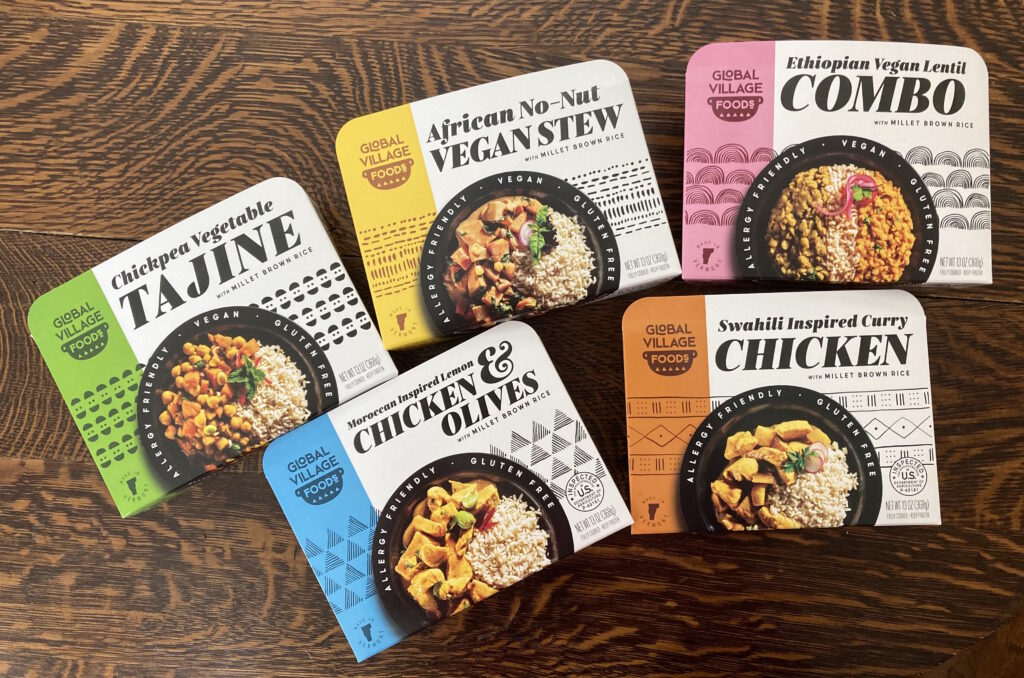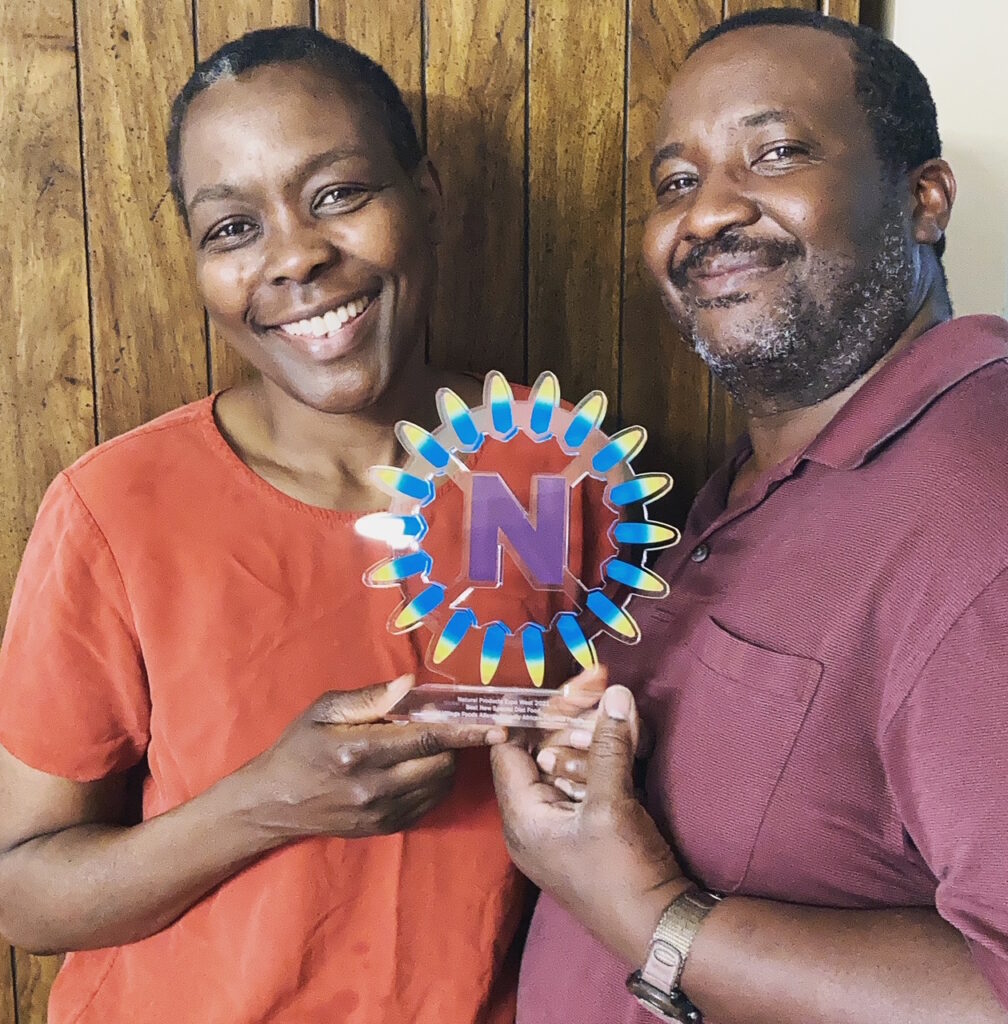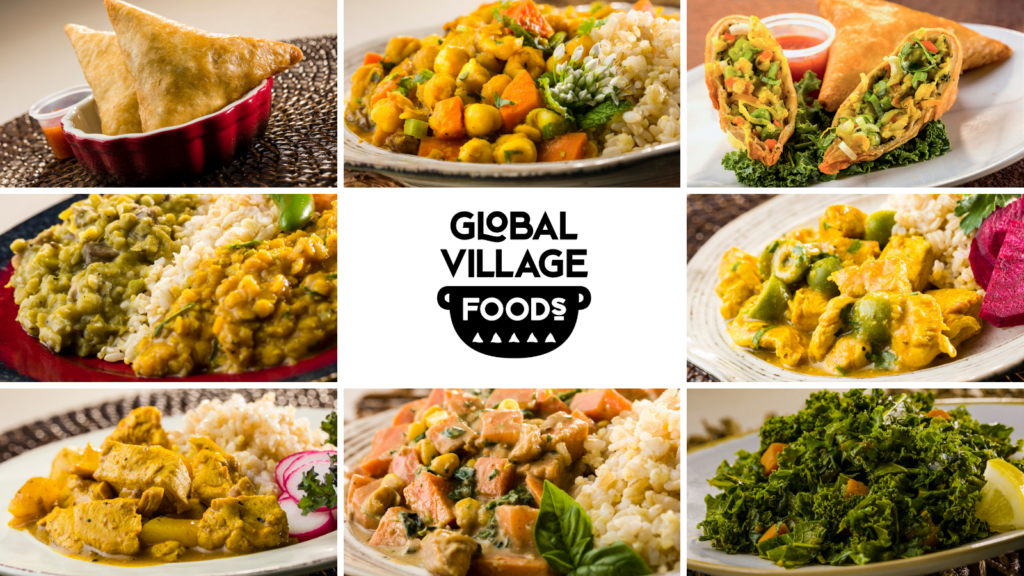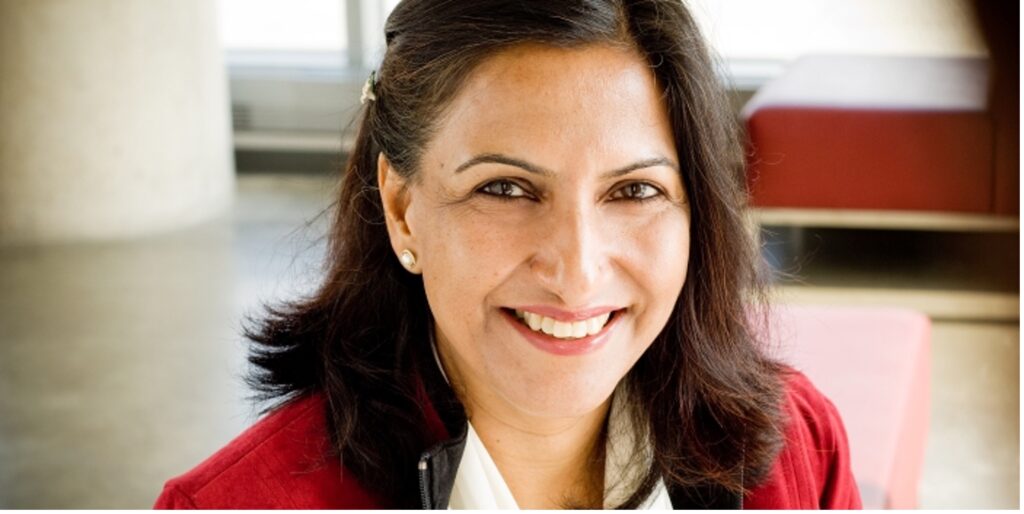Written By:
Nancy Demuth ‘22
Creative Director
Connect with Nancy on LinkedIn
Tahagod Mohamed ‘22
Contributing Writer
Connect with Tahagod on LinkedIn

As busy SI-MBA students, frozen food has become a staple of our diets this year. Luckily for us, few frozen food options are tastier, or healthier, than those made by Global Village Foods – a Vermont-based family business whose delicious meals are readily available in Burlington.
Global Village Foods’ founders Damaris and Mel Hall – from Kenya and Memphis, respectively – are on a mission to make delicious, nutritious, allergen-free African food accessible to everyone. Currently a first-generation family business, the second generation is already getting involved, with the couple’s daughter, Wangene, making an impact as Director of Marketing.
To hear the story behind the delicious meals we’ve been enjoying throughout the year, we spoke with Damaris and Mel to hear more about their business’ unique story and philosophy.
What’s the story of Global Village Foods so far?
Damaris: When I moved to Vermont 30 years ago, I found it very difficult to adjust to the food. I missed African and Kenyan food, but ethnic foods were difficult to find back then. In my moments of desperation, I would ask my mother to ship 50-pound bags of millet to me from Kenya! Eventually, we were able to source US-grown millet and teff from a local co-op, and started cooking African food at home. Then we started catering at small events, because we wanted to introduce our delicious food to Americans, too.
Mel: We realized our food is best when we make it ourselves, the way we would make it for you, if you came for dinner – that’s the energy we bring to it. Fast forwarding to 2022, we’ve done everything imaginable in food service, including running a 68-seat full-service restaurant. That was too difficult to manage with our young family, so we switched to selling prepared meals to local co-ops. Our frozen meals and snacks have been stocked in Whole Foods since 2017 and we’re now in all 42 stores of the entire Northeast region, as well as about 180 other specialty food stores.

Why did you start focusing on allergen-free food?
Damaris: Along the journey, we had a son who developed food allergies. We found he did much better eating our food because it contained fewer allergens.
Mel: Most of our offering is dairy, egg, nut, soy, sesame, seafood, and gluten-free. This has made us attractive to college environments, where you have to be really aware of students with food allergies. We’ve actually just started servicing the dining halls at UVM, and will be rolling out to a number of other schools in the Boston area.
Why Vermont, and what is it like being part of the Vermont business ecosystem?
Damaris: We didn’t choose Vermont – Vermont chose us! The food we cook is mostly vegetarian, with a very limited amount of meat, and Vermonters were really receptive to that. One of the first events we served our food at was the Vermont Reggae Festival – most of that crowd was actually vegetarian and they really enjoyed it. There’s also the element of introducing people to my culture. I’m really passionate about food, and I believe that people should eat good food that is going to do them good. My grandmother lived to be 92 and my grandfather 104, and I think that has a lot to do with eating food in its natural state, the way it was meant to be.
What’s your sustainability philosophy at Global Village Foods?
Mel: Damaris and I actually met in an Environmental Studies program when I was in Kenya, so sustainability has always been a point of interest for us. Living in Vermont, there’s a whole sensibility around giving back, not just to the environment, but also to the community. One of the great things about doing frozen food, too, is that it eliminates waste. We also reduce food waste as much as possible in our kitchen, as well as our paper and cardboard output.
Damaris: I think we just like to use the common sense method. We ask ourselves: “What are we feeding our customers, and is it sustainable?” We work with local farmers to source locally-grown produce. We also use a lot of millet, not just because we eat a lot of it in Kenya, but because it’s a crop with a very small environmental impact. As a business, we follow the principle of “people first”, because if you care about the people and the environment, the results will always be beautiful.

Are there any sustainability projects you’re working on currently?
Mel: One of the environmental pain points I would love to resolve is our packaging – we currently pack our meals in a black plastic tray. We attempted to switch to a compostable film tray, which unfortunately could not sustain various conditions in the marketplace. For example, if you thawed the meal out, the tray could completely fall apart. I would love for someone to invent a really solid, truly recyclable, bio-compostable tray.
What’s it like being a Black-owned business in Vermont?
Mel: Being in Vermont has been liberating of preconceived notions, in the sense that people are more interested in your product’s quality than it being made by a Black-owned business. What has driven our growth is people finding our food culturally different, nutritionally balanced, and tasty! Now, the flip side is that in America, minority-owned businesses do not all enjoy the same level of growth and success because of systematic barriers. Financial markets here do not account for the imbalanced starting point that minority businesses come with compared to their white counterparts. Having said that, if anyone is going to make a progressive move to recalibrate, it will be Vermont!
Damaris: What I experienced is that when we are dealing with individuals, they are more understanding about diversity. However, when you are talking about institutions, the inclusive language does not translate to purposeful funding for minority businesses. The criterion for judging is still set at fairly high standards compared to the reality experienced by these minority businesses. The institutional brick wall does exist and while there are programs intended to help small businesses, the message gets lost in translation once it reaches banks.

What is next for Global Village Foods?
Damaris: Our hope and dream is to make Global Village mainstream so that people know what African families eat, which is the same food you eat at home, but spiced differently. We want to make African food a staple cuisine that is just as well-known as Chinese, Korean, and American cuisines. In terms of engaging the next generation, we want to see our children carry on the business if they are interested. Our children have been fortunate to see our business through all its stages and most importantly, they see the wonderful work culture we built for our employees. That is something we value and hope to continue seeing in the future.
Mel: Our goal is to distribute African food from Vermont to the rest of the country. We want to develop a solid system that operates at the efficiency of a corporation, but with Vermont’s ethos of social responsibility. Of course, we intend to do that while still incorporating sustainability into our supply chain. As a family business, we also hope to expose our children to the strategic business planning and logistics needed to get us there. Our eldest daughter has already brought a lot of growth as Director of Marketing.
What is your advice to our SI-MBA class, or any aspiring business owners?
Damaris: Understand that business is a language, so seek help and surround yourself with people who know more than you to accelerate your growth. Find something you are passionate about, because that is what will give you meaning when you are faced with hard times. And as you make the profits, do something with them that will be beneficial to humanity.
Mel: Know your why, and don’t restrict your why. There will be times when the “what” and “how” put a lump in your throat and a pit in your stomach. The passion you develop for your work will get you through those hard times.
To learn more about Global Village Foods, check out their website or find a distributor near you. (UVM students can also find Global Village Foods products at the dining hall!)
This interview has been lightly edited for clarity.

